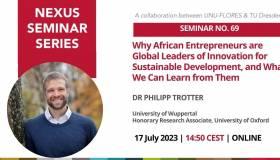In their seminal 2018 paper, Johan Schot and W. Edward Steinmueller have identified the need for a third frame of innovation which drives business innovation towards transformative change. Given the urgency of sustainability transformations to enable a prosperous future for humanity and the planet and given the critical role business play in this transformation, channeling innovation towards sustainability is crucial. Yet the slow pace of change in the Global North, where companies often rely more on dodgy carbon offsets rather than actually reducing emissions, puts this transition at risk.
This talk discusses the case of African entrepreneurs in the off-grid energy sector and the types of complex business model innovations they have produced: Despite receiving little support and significant structural challenges, these entrepreneurs have managed to innovate their value propositions, value creation approaches and value networks in ways that drive sustainable development. Their innovations, as well as the types of policy and finance arrangements required to scale them, carry important lessons for practitioners and scholars of innovation for sustainable development globally, and in the Global North, specifically.

About the Speaker: Dr Philipp Trotter
Dr Philipp Trotter is an Assistant Professor in Sustainability Management at the University of Wuppertal and an Honorary Research Associate at the Smith School of Enterprise and the Environment at the University of Oxford. His research focuses on electrification in sub-Saharan Africa, covering both technical aspects of energy planning optimisation and quantitative and qualitative policy analyses and design. In his current research project, he engages with public and private energy sector stakeholders and rural communities in Uganda and Zambia to understand how rural electrification can best be driven domestically.
He has several years of experience working in the energy sector of emerging economies. Prior to his academic career, he worked with several large-scale energy utilities in Africa, Asia and Europe as a consultant with McKinsey & Company. He is a Globalizer Advisor for Ashoka International, working on scale-up strategies for social businesses in Africa, Asia and the US. He studied for his PhD at the Department of Mechanical Engineering at the University of Bath and holds an Energy Engineering Diplom degree from RWTH Aachen University (Distinction) and an MSc in Politics of the Developing World from LSE (Distinction).
Background of the Series:
UNU-FLORES in collaboration with PRISMA – Centre for Sustainability Assessment and Policy on behalf of TU Dresden are excited to announce the Nexus Seminar Series. The joint seminar series, which launched in 2015, features lectures by senior scholars and successful practitioners that highlight all dimensions of research on the Nexus Approach, ranging from hands-on implementation strategies to theoretical debates. The Nexus Seminars serve not only as a platform for scientific exchange and cooperation between UNU-FLORES and TU Dresden but also a medium for the partner institutions to discuss their research with a broader audience. The Nexus Seminar, which takes place monthly during the academic semester, is open to the public and delivered in a digital format through online webinars.



